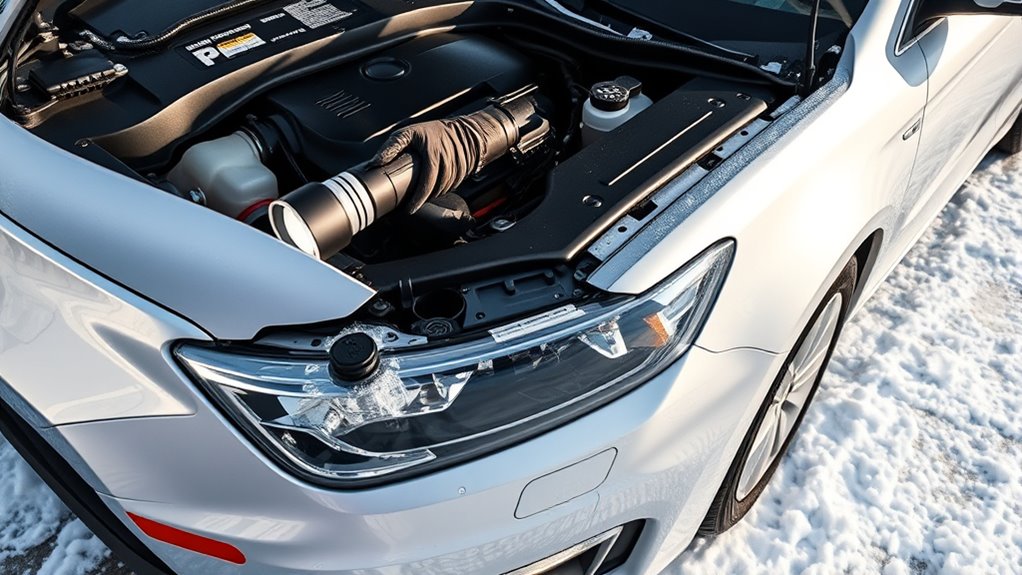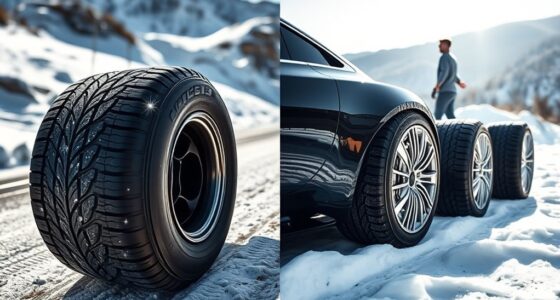To prepare your car for cold weather, start by checking your tire pressure regularly and inspecting your tread depth to guarantee good traction. Test your battery’s health and clean terminals to prevent starting issues. Top off essential fluids like antifreeze, engine oil, and windshield washer fluid. Inspect wipers and look for damage. Maintaining these components helps keep your vehicle reliable and safe. Continue with these tips, and you’ll be ready to tackle winter roads confidently.
Key Takeaways
- Regularly check and inflate tire pressure to manufacturer’s recommendations for better traction on icy roads.
- Inspect and replace worn windshield wipers, and top off windshield washer fluid to ensure clear visibility.
- Test and replace aging batteries to prevent cold-start failures and maintain reliable engine starts.
- Check antifreeze levels and overall fluid top-offs to protect engine components from freezing damage.
- Schedule vehicle inspections before winter to identify and address potential issues proactively.

As winter approaches, it’s essential to prepare your car for the colder months ahead. One of the most important steps is focusing on tire maintenance. Cold temperatures can cause the air pressure in your tires to drop, reducing traction and increasing the risk of accidents. Before winter hits, check your tire pressure and inflate them to the manufacturer’s recommended levels. Don’t forget to inspect the tread depth; worn-out tires won’t grip icy or snowy roads effectively. Consider switching to winter tires if you live in an area with heavy snowfall, as they’re designed to perform better in cold conditions. Regularly rotating your tires helps guarantee even wear, extending their lifespan and maintaining ideal performance. Also, keep an eye out for any signs of damage, like cuts or bulges, which can compromise your tire’s integrity in icy conditions. Proper tire technology can significantly improve safety during winter driving.
Battery health is another critical factor when preparing for winter. Cold weather puts extra strain on your vehicle’s battery, making it harder to start your car and increasing the likelihood of unexpected breakdowns. Start by having your battery tested at a trusted auto shop. A simple test can reveal if your battery is weak or nearing the end of its life. If your battery is more than three years old, it’s wise to replace it before the temperature drops further. Keep the battery terminals clean and tight, removing any corrosion with a mixture of baking soda and water. This ensures a good connection and helps your car start smoothly in cold weather. If your car struggles to start or if you notice dimming headlights, these could be signs that your battery is failing and needs immediate attention.
In addition to tire maintenance and battery health, don’t forget other essentials like checking your antifreeze levels, inspecting windshield wipers, and topping off fluids. But tire pressure and battery checks are foundational because they directly impact your vehicle’s reliability and safety during winter. Taking these proactive steps means you’ll reduce the chances of getting stranded or facing dangerous driving conditions. Remember, winter driving requires extra caution, and a well-maintained vehicle is your best defense against the challenges of cold weather. Regular inspections and timely maintenance will keep you safe and ensure your car runs smoothly all season long.
Frequently Asked Questions
How Often Should I Replace My Windshield Wipers in Winter?
You should replace your windshield wipers every 6 to 12 months for ideal wiper blade maintenance, especially during winter windshield care. Cold weather can cause blades to crack or become less effective, so check them regularly for signs of wear like streaks or chatter. If you notice any issues, replace them promptly. Proper wiper blade maintenance ensures clear visibility and safer driving in winter conditions.
Can I Use Regular Engine Oil in Cold Temperatures?
Imagine Jane using regular engine oil in winter, only to find her engine struggling to start. In cold temperatures, you shouldn’t use regular engine oil because its viscosity thickens, making it harder for your engine to run smoothly. Opt for a winter-grade oil with lower viscosity, like 5W-30, to guarantee proper lubrication. Follow your oil change schedule, especially before winter, to keep your car running reliably in cold weather.
What’s the Best Way to Prevent Ice Buildup on My Car?
To prevent ice buildup on your car, start by regularly clearing snow and ice from your windshield and windows, ensuring better windshield safety. Apply a windshield washer fluid with antifreeze to help keep your glass clear and resist freezing. Use a windshield cover or park in a garage or sheltered area when possible. These ice prevention tips keep your visibility clear and reduce the risk of accidents during winter driving.
How Do I Choose the Right Winter Tires for My Vehicle?
When choosing winter tires, you look for a tire with deep tread depth for better grip on snow and ice. Make certain to maintain proper tire pressure, as cold weather can cause pressure drops, reducing traction. Consider tires specifically designed for winter conditions, and check reviews for performance. Properly selecting and maintaining your winter tires ensures safer driving, especially in icy or snowy conditions.
Is It Necessary to Change My Car’S Coolant for Winter?
Your car’s cooling system is the heart of winter driving, and neglecting antifreeze maintenance is like ignoring a ticking time bomb. You should definitely change your coolant for winter to prevent freezing and overheating. Regular coolant leak detection guarantees your system stays sealed. By doing this, you protect your engine from harsh cold, keeping it running smoothly and avoiding costly repairs. Stay proactive and keep your vehicle prepared for winter’s worst.
Conclusion
Now that you know how to prepare your car for cold weather, you’re all set to face winter head-on. Think of your car as a trusty snowshoe, ready to glide smoothly through icy conditions. By following these tips, you’ll keep your vehicle running safely and reliably all season long. Stay proactive, stay warm, and enjoy the wintery roads with confidence—because with a little prep, winter driving can be just as fun as a snowy adventure.






